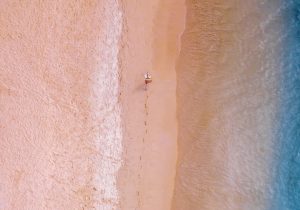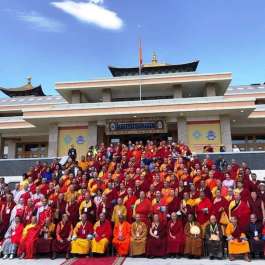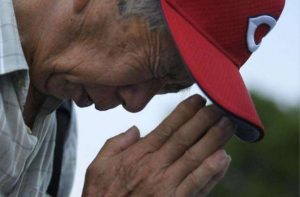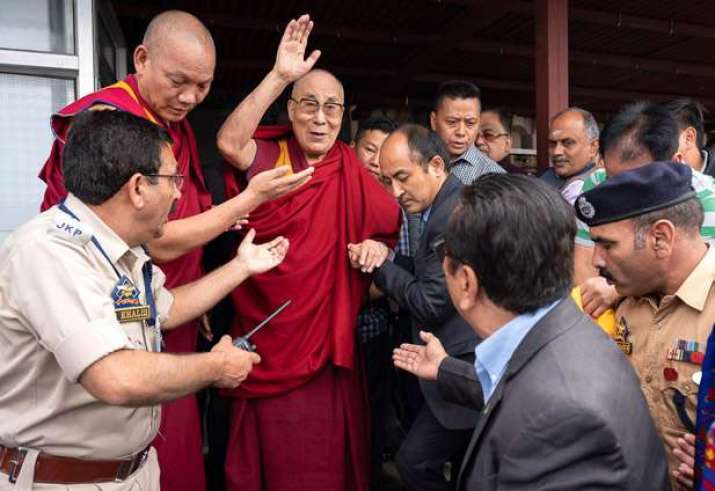
His Holiness the Dalai Lama on Tuesday praised efforts by Himalayan Buddhist communities in India to turn monasteries into centers of training, observing that transforming the monastic system was a necessary move toward a more democratic paradigm in the modern era.
Arriving to a rousing welcome from thousands of followers who lined the streets of the city of Leh, in Ladakh, ahead of preparations to mark his 83rd birthday, the Dalai Lama was greeted with a ceremonial reception led by the former spiritual head of the Gelug school of Tibetan Buddhism, Rizong Rinpoche; the seventh Taklung Matrul Rinpoche; Drikung Chetsang Rinpoche, the 37th Drikung Kyabgon head of the Drikung Kagyu order; and Thiksey Rinpoche, chief lama of Thiksay Monastery; along with other rinpoches and senior lamas.
Addressing an assembly of rinpoches, monks, nuns, local residents, pilgrims, and local dignitaries at his official residence in Ladakh, Shewatsel Phodrang, on Tuesday, His Holiness noted that the ongoing shift toward a more democratic society also necessitated change within monastic institutions. “With the shifting . . . paradigm from [a] feudal system to democracy, it is necessary to bring change in our monastic system as well,” he emphasized. “[The] feudal system garners hate and violence, while democracy gives [the] right to all for developing a peaceful environment,” (The Echo of India, The Statesman)
The issue was recently addressed during a two-day conference titled “Indian Himalayan Buddhist Communities: Cultural Preservation and Identity – Challenges and the Way Forward in the 21st Century” in New Delhi on 29–30 June. The forum was a platform to discuss issues facing the Tibetan diaspora in India and to consider strategies for meeting the challenges to Buddhism and traditional culture from modern consumerism.
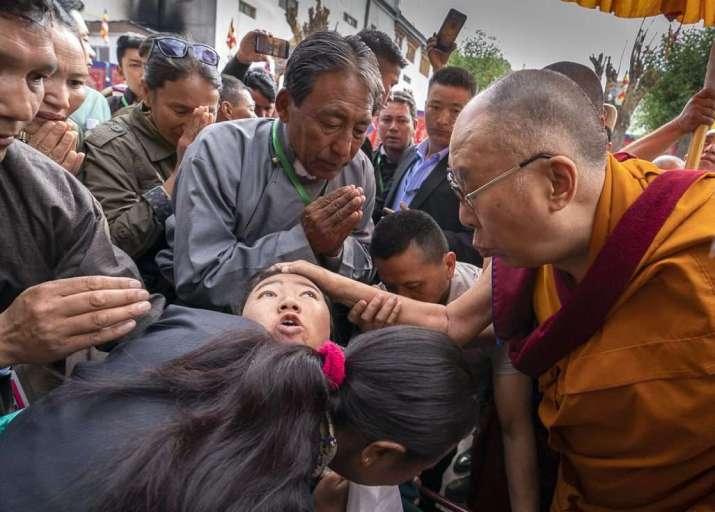
“I’ve been coming here for more than 50 years. To begin with Ladakh was quite underdeveloped. That’s now changed and we can see all sorts of material progress,” the Dalai Lama told the assembly in Leh. “In the monasteries too, compared with 50 years ago, the quality of study has grown significantly. Indeed, I recently met members of the Tawang Foundation who have plans to transform all the monasteries from here to Tawang into serious centers of learning.
“Meeting with Vinaya scholars in Delhi the other day, one of the things I asked them was whether the Buddha’s teachings remain relevant today. Since, like other religious traditions, the Buddhadharma teaches about love, compassion, and tolerance, it is not only relevant but necessary. Nevertheless, I never tell anyone that Buddhism is the best tradition. It would make no more sense than saying that a single medicine was best for all people in all circumstances. In fact, the Buddha taught different things to different people, depending on their particular dispositions, which we refer to as the three turnings of the Wheel of Dharma.” (The Office of His Holiness the Dalai Lama)
Ladakh, known as “the land of high passes,” is a mountainous territory in the Jammu and Kashmir region of India’s far north, bordering with Tibet. Sitting at an altitude of 3,524 meters, Leh is a high-desert city in the Himalayas and the capital of Leh District. The district has large ethnic Tibetan population, most of whom speak Ladakhi, an East Tibetan language, and practice Vajrayana Buddhism.
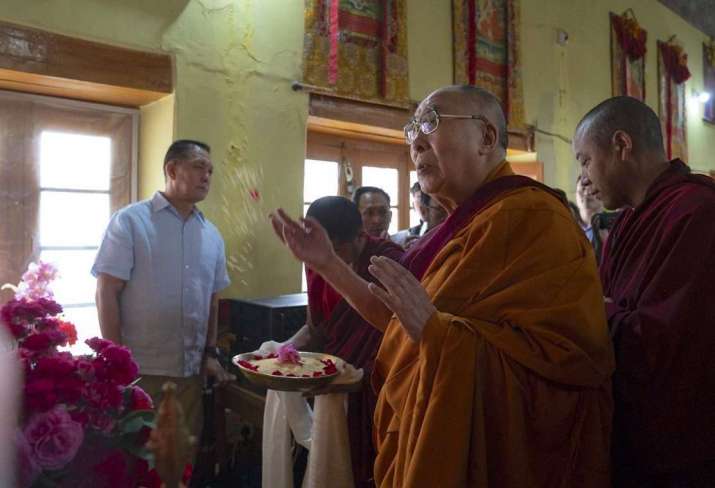
On Wednesday, the Dalai Lama made a pilgrimage to the Leh Jokhang, during which he also spoke on some of the challenges facing the modern societies, observing that rapid materialistic development has been accompanied by a growing global crisis.
“The world today is facing a serious crisis of emotions. People think destructive emotions are a natural part of the mind,” His Holiness explained. “Advice from ancient Indian psychology can show us they are not and that we can tackle and eliminate them. We need to ask ourselves how to find happiness—it’s not in money and power. As I mentioned before, we need to discover not only what disturbs our minds, but also what the antidotes to those factors are.
“In this respect, all the world religions should stress on spreading the qualities of love, peace, forgiveness, and compassion. The 21st century young generation should read the scriptures and look for themselves the relevance of [the] 2,600-year-old Buddhadharma in today’s world.” (The Office of His Holiness the Dalai Lama, The Echo of India)
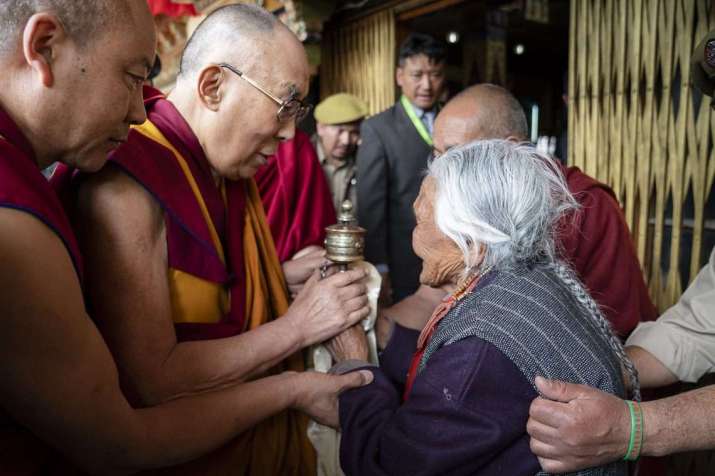
A spokesperson for the Central Tibetan Administration noted that a grand celebration in honor of His Holiness’ 83rd birthday on 6 July would be held at Shewatsel Phodrang, adding that: “The president of the Central Tibetan Administration, Dr. Lobsang Sangay, will also be attending the 83rd birthday celebrations.” (Central Tibetan Administration)
A live webcast of the birthday celebrations in Leh will be made available on the official website of the Office of His Holiness the Dalai Lama on 6 July.
See more
Arrival in Ladakh (The Office of His Holiness the Dalai Lama)
Pilgrimage to Leh Jokhang (The Office of His Holiness the Dalai Lama)
Live Webcast: 83rd Birthday Celebration (The Office of His Holiness the Dalai Lama)
Dalai Lama welcomes emphasis on converting monastries into learning centres (Money Control)
Dalai Lama appreciates decision to convert monasteries into learning centres (The Statesman)
Dalai Lama welcomes converting monasteries into learning centres (The Echo of India)
Dalai Lama to celebrate 83rd birthday in Ladakh (Central Tibetan Administration)
H. H. The Dalai Lama Arrives In Ladakh Where He Will Rest For 2-3 Weeks (Tibetan Journal)




